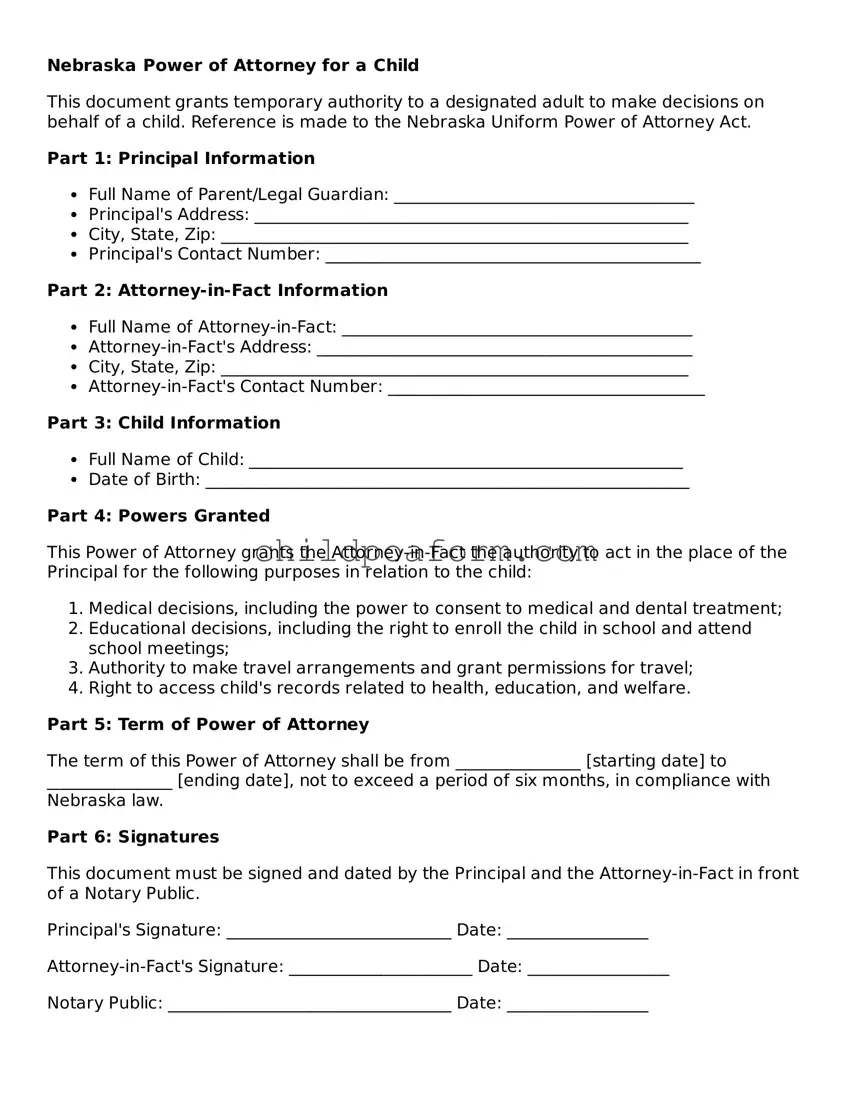Instructions on Utilizing Nebraska Power of Attorney for a Child
When adults take a meaningful step in ensuring a child's welfare by granting another person the authority to make decisions for them, they use a Power of Attorney for a Child form. In Nebraska, this legal document is specifically designed to allow parents or guardians to formally appoint a trusted individual to act in their stead. This appointment can cover a range of responsibilities, from education to healthcare decisions. It is vital to approach this document with care, ensuring all information is accurate and reflects the true intentions of those involved. Completing the Nebraska Power of Attorney for a Child form requires attention to detail and an understanding of the required steps.
Steps to Fill Out the Nebraska Power of Attorney for a Child Form:
- Begin by obtaining the latest version of the Nebraska Power of Attorney for a Child form. Ensure it is the correct document specific to Nebraska, as each state has its own laws and requirements.
- Read the entire form carefully before filling it out. This ensures an understanding of the responsibilities and authorities being granted.
- Enter the child’s full legal name and date of birth in the designated spaces at the top of the form.
- Fill in the full legal name(s) of the parent(s) or current legal guardian(s). Include contact information such as address and phone number.
- In the section designated for the appointed attorney-in-fact (the individual granted power of attorney), enter their full legal name and contact details. Make sure this person is someone the parent or guardian fully trusts to make decisions on behalf of the child.
- Detail the specific powers being granted to the attorney-in-fact. This may include the ability to make decisions regarding the child’s education, healthcare, and general welfare. Be as specific as possible to avoid any confusion or misuse of authority.
- If the power of attorney will have a specific time limit, specify the start and end dates. If no time limit is desired, indicate this clearly on the form.
- Review the form with the attorney-in-fact to ensure they understand and agree to their responsibilities. This step is crucial for ensuring that everyone is on the same page and agrees to the terms laid out.
- Have the form notarized. Both the parent(s) or guardian(s) and the designated attorney-in-fact must sign the form in the presence of a notary public. This step legally acknowledges the signatures and the agreement itself.
- Keep the original signed and notarized form in a safe place. Provide copies to the attorney-in-fact and any institutions or individuals who may need to be aware of the arrangement, such as schools and healthcare providers.
Once the Nebraska Power of Attorney for a Child form is completed and filed accordingly, the appointed attorney-in-fact will possess the legal authority to make decisions on behalf of the child within the scope outlined in the document. It's important to communicate this change to all relevant parties and ensure the child understands the arrangement to the best of their ability. Additionally, should circumstances change, it may be necessary to revisit and amend the form to accurately reflect current wishes and conditions.
